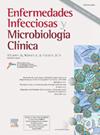Emergence of Oropouche virus among international travelers: A growing concern in non-endemic areas
IF 2.5
4区 医学
Q3 INFECTIOUS DISEASES
Enfermedades infecciosas y microbiologia clinica
Pub Date : 2025-10-01
DOI:10.1016/j.eimc.2025.01.005
引用次数: 0
Abstract
Introduction
Oropouche fever is an emerging disease caused by an arthropod-borne virus, Oropouche virus. This virus is mainly circulating in Central and South America. In 2024 they have been reported an ongoing outbreak.
Methods
For this study, travelers returning from endemic areas with dengue-like symptoms and negative results for dengue from March to October 2024, were tested for Oropouche through RT-PCR.
Results
Among 43 patients tested, we detected an imported case of Oropouche fever imported from Cuba in a traveler presenting biphasic fever and neurological symptoms. The virus was detected by RT-PCR in urine samples collected more than one month after the onset of symptoms, suggesting prolonged viral shedding and expanding the diagnostic period for molecular confirmation of the infection.
Conclusion
Although only few cases have been yet reported in European travelers, the expansion of the virus in the Americas supports laboratory preparedness and clinical awareness.
国际旅行者中出现欧罗波切病毒:在非流行地区日益引起关注
口袋热是由一种节肢动物传播的病毒——口袋病毒引起的一种新出现的疾病。这种病毒主要在中美洲和南美洲流行。据报道,在2024年,他们正在爆发疫情。方法采用RT-PCR方法对2024年3月至10月从登革热流行地区返回且登革热样症状呈阴性的旅行者进行Oropouche检测。结果在43例病例中,我们发现1例输入性古巴奥罗波切热,该病例出现双相热和神经系统症状。在症状出现一个多月后收集的尿液样本中,通过RT-PCR检测到该病毒,表明病毒脱落时间延长,并延长了对感染进行分子确认的诊断期。结论虽然在欧洲旅行者中报告的病例很少,但该病毒在美洲的扩大支持了实验室准备和临床意识。
本文章由计算机程序翻译,如有差异,请以英文原文为准。
求助全文
约1分钟内获得全文
求助全文
来源期刊
CiteScore
2.10
自引率
8.00%
发文量
194
审稿时长
29 days
期刊介绍:
Hoy está universalmente reconocida la renovada y creciente importancia de la patología infecciosa: aparición de nuevos agentes patógenos, de cepas resistentes, de procesos con expresión clínica hasta ahora desconocida, de cuadros de una gran complejidad. Paralelamente, la Microbiología y la Infectología Clínicas han experimentado un gran desarrollo como respuesta al reto planteado por la actual patología infecciosa. Enfermedades Infecciosas y Microbiología Clínica es la Publicación Oficial de la Sociedad Española SEIMC. Cumple con la garantía científica de esta Sociedad, la doble función de difundir trabajos de investigación, tanto clínicos como microbiológicos, referidos a la patología infecciosa, y contribuye a la formación continuada de los interesados en aquella patología mediante artículos orientados a ese fin y elaborados por autores de la mayor calificación invitados por la revista.

 求助内容:
求助内容: 应助结果提醒方式:
应助结果提醒方式:


